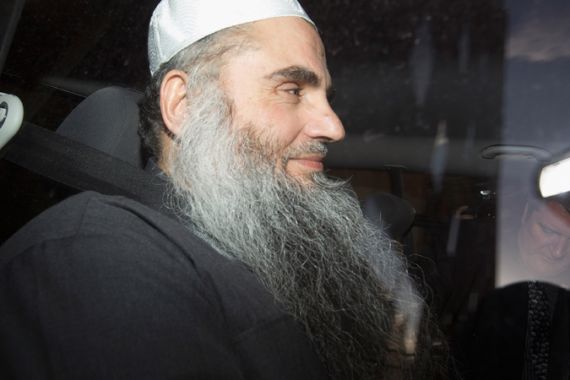European court turns down Abu Qatada request
UK-based Muslim preacher could be extradited to Jordan after he loses legal bid in the European Court of Human Rights.

Abu Qatada, a Muslim religious leader, has lost a legal bid in the European Court of Human Rights to challenge Britain’s long-running attempts to deport him to Jordan to stand trial on terrorism charges.
Theresa May, UK home secretary, said she was confident Tuesday’s decision by the Strasbourg-based court meant Abu Qatada would soon be “out of Britain for good”.
Abu Qatada, 51, once described by a Spanish judge as “Osama bin Laden’s right-hand man in Europe”, was convicted in his absence in Jordan in 1998 for involvement in terror attacks.
His extradition from Britain has repeatedly been blocked by courts amid concerns about his possible treatment in Jordan, with his lawyers claiming he could be tortured there.
Abu Qatada had asked the European Court of Human Rights to refer his case to a panel of its most senior judges.
The court said it turned down his request, but gave no reasons for its refusal.
His case has been a headache for successive British governments, accused by critics of not doing enough to deport
Abu Qatada.
‘Fair’ retrial
Jordan has pledged a “fair” retrial of Abu Qatada and reached an agreement with Britain in 2005 to try to ensure he is not mistreated if he is returned.
Abed Shehadeh, a senior Jordanian Salafist leader, condemned the court ruling and insisted that Abu Qatada’s life could even be in danger if he is sent to Jordan.
“We condemn this decision,” Abed Shehadeh, better known as Abu Mohammad Tahawi, told AFP news agency. “Abu Qatada’s life would be definitely in danger if Britain extradites him to Jordan.”
Shehadeh said Abu Qatada had “nothing to do” with the crimes of which he is accused.
“The United States, Israel and their agents in the region are simply targeting the man,” he said.
Abu Qatada claimed asylum in Britain in 1993, but officials say he is a threat to British security and should be deported before London hosts the Olympic Games in July and August.
Qatada, whose real name is Omar Othman, has been in and out of jail since he was first detained without charge under British anti-terrorism laws in 2002.
Britain says videotapes of his sermons were found in a German apartment used by three of the people who carried out al-Qaeda’s September 11, 2001, attacks on the US.